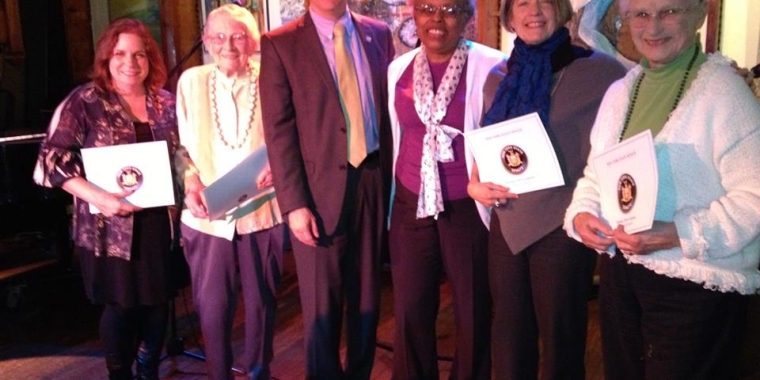
Senator Gipson and Assemblyman Skartados: ‘Rosie’s Law’ would help children and disabled testify in court

For Immediate Release: May 6, 2013
Media Contact: Jonathan Heppner | 845.463.0840 | heppner@nysenate.gov
Senator Gipson and Assemblyman Skartados: ‘Rosie’s Law’ would help children and disabled testify in court
ALBANY, NY -- Senator Terry Gipson (D-Rhinebeck) and Assemblyman Frank Skartados (D-Milton) announced ‘Rosie’s Law’ in a press conference on the Capitol steps Monday afternoon (S.4865/A.7159). The bill would permit judges the discretion to allow certain witnesses to be accompanied by a facility dog when providing testimony.
Rosie’s Law is named after Rosie, the first judicially approved courtroom dog in New York State. With Rosie’s help, a 15-year-old girl (known in the case as “Jessica”) from Dutchess County was able to provide testimony against her father who had raped and impregnated her over the course of four years of abuse. This testimony led to the man’s conviction. Rosie passed away in November 2012.
“The victim of these heinous crimes would have been unable to provide this invaluable testimony without the comfort provided by Rosie,” Senator Gipson said. “Although Rosie did no more than nuzzle the young girl’s leg when she spoke of these horrible events, she couldn’t have done it without her. We must make it possible for all witnesses facing challenging circumstances such as these to have access to the comfort and support they need to complete the emotionally trying process of testifying.”
“Testifying in a courtroom can be stressful and scary for adults, but for a traumatized child or person with disabilities, it can be downright terrifying,” Assemblyman Skartados said. “Facility dogs would help comfort those on the stand as they provide critical information and would help make our judicial system more compassionate, and ultimately, more effective.”
Dutchess County Assistant District Attorney Kristine Hawlk who was the senior prosecutor in this case and requested the use of Rosie agreed stating, “I have no doubt that Rosie helped ease the witness’s stress during her testimony. I strongly support the use of courthouse dogs in cases such as Senator Gipson and Assemblyman Skartados’ legislation will help to make that possible.”
Lori Stella, LMSW, of the Children’s Home of Poughkeepsie was Jessica’s therapist during the trial and added, “Jessica immediately bonded with Rosie and was able to share her story in a way we hadn’t seen from her before. Rosie was integral in the judicial process and aided in Jessica’s testimony and ultimately her recovery.”
Sherry Cookinham, also of the Children’s Home of Poughkeepsie, who acted as Rosie’s handler during the trial added, “Rosie was quiet and unobtrusive and provided the comfort Jessica needed to let the truth come out. I hope to see courthouse dogs like Rosie used in great abundance in the future and would like to commend Senator and Assemblyman for their efforts.”
Dale Picard, Executive Director of Educated Canines Assisting with Disabilities (ECAD) and Rosie’s owner noted that Rosie was “something special” and added, “Courthouse dogs like Rosie are specially trained to participate in the high stress environment of the courtroom without being disruptive. ‘Rosie’s Law’ will allow these dogs to be used by both sides of a case with children, witnesses that are deemed physically or mentally impaired and victims or witnesses of violence or sexual assault.”
Kathleen Murphy, Executive Director of the Center for Child Abuse Prevention noted the increased emotional needs of these groups stating, “Children and other victims or witnesses of violence or sexually-related crimes are already faced with the stress of their experiences. The additional stress of the courtroom environment can impede their abilities to successfully communicate their experiences. Just the mere presence of a courtroom dog like Rosie can alleviate some of this stress and allow for successful testimony.”
Members of the Seattle-based Courthouse Dogs Foundation, a national advocacy group that travels the country to campaign for this issue, were present during Monday’s press conference. Ellen Stephens-O’Neill, Esq, the founder of the foundation lent her voice in support of this legislation stating, “The use of courthouse dogs in a case can mean the difference in making sure there are accurate results. ‘Rosie’s Law’ will aid New York courts in the critical truth-finding process and allow for complete and meaningful testimony.”
Celeste Walsen, DVM, the Executive Director of the Courthouse Dogs Foundation echoed her colleague adding, “It is legislation like Senator Gipson and Assemblyman Skartados’ that we have worked so hard to see across the country. We are hopeful of its passage and look forward to the expanded use of facility dogs in New York courtrooms.”
Additionally, Richmond County District Attorney Daniel M. Donovan, Jr., who was unable to attend the press conference, issued the following statement in support of ‘Rosie’s Law’: “I applaud the efforts of Senator Terry Gipson and Assemblyman Frank Skartados to introduce legislation that would allow certain witnesses to testify in court with the assistance of a facility dog. Over the past year, I have seen firsthand the comfort and strength that my facility dog, Bronksey, has given to traumatized crime victims. Last May, I was the first New York City prosecutor to introduce the use of a facility dog and Bronksey has since proven to be an invaluable asset. Just last month, Bronksey gave a young sexual abuse victim the courage to bravely share her horrific experience with my prosecutors. The defendant was successfully convicted for his monstrous actions and is now facing up to 25 years in prison at sentencing. In total, Bronksey has been instrumental in assisting with more than 140 victims of various crimes and the family members of those victims. I fully support the use of facility dogs and Bronksey barks his blessing as well!"
------ ------


